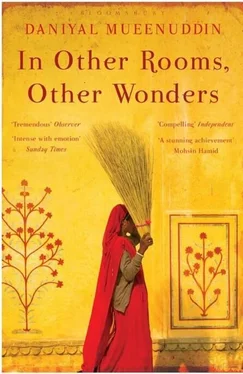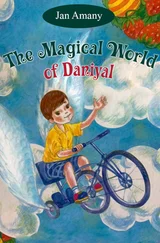Lily insisted that the two main ceremonies, the shadi and the valima, be telescoped into one, that it be more or less merely a celebratory dinner, to the chagrin of both her family and his, cousins, uncles, old family friends, hangers-on, sponges, all inveterate marriagegoers — aunts and great-aunts, who hobbled around the party wearing flesh-colored socks and high heels under their brilliant but ancient Indian saris, complaining about the food; and sly second cousins, who thought this curtailed wedding the last and best stroke delivered against propriety by Lily, the perfectly aberrant coda to her career. On Murad’s side several personages attended, out of consideration for his father — a governor of twenty years ago, several old hostesses, beauties and battleaxes from a generation back. Before the wedding Lily had dreaded it all, kept joking with Murad about eloping; then on the day of the ceremony worried that it would be a sad inadequate affair, had cried in her bathroom, piling on the misery by imagining herself as an orphan, as unloved. A tent had been set up in the garden, air-conditioned against the heat of the September night, and she had feared that the tables, decorated by Mino with calla lilies that he somehow procured from Karachi, would be empty. But the tables were full, her parents had acted exactly as they should, her closest friends had flown in. Girls she had known when she was little had crowded around her, and it was with them, surprisingly, that she had found the most joy in the occasion, as if she had been translated back to that time, to the person she was then.
Just before the guests arrived, Murad had whispered to her, ‘Come with me for a moment,’ and they had slipped away from her parents’ house to the cottage. He wore a long formal coat, a sherwani, embroidered with gold thread, and she wore a green shot-silk gown designed by herself, heavily worked, and flowing pants, wearing his family tikka pendant on her forehead. Standing in front of the mirror in her bedroom, he said, ‘Look at us.’ There they were, the two of them in their wedding clothes. ‘We’ll do it now,’ he said, ‘our own way.’ Very serious, looking into her eyes in the mirror, he swore, ‘I marry you, Lily, for richer, for poorer, in sickness and in health, in happiness and sorrow, till death do us part.’ She repeated the words, and that had been for her the real wedding, that is when tears had started into her eyes. From his pocket he took a ring that had belonged to his mother, an emerald intaglioed with a single iris just coming into bloom — he described it that way.
As he gave the ring to her, with a queer smile on his face he said, ‘I hope this isn’t the wrong thing, coming from her — the poisoned chalice.’
They had spoken of his troubles with his mother, his fear of being consumed by a woman. ‘We already agreed,’ she replied, soothing, dismissing. ‘That was in the past.’
Only a small crowd remained, it was late, her parents had gone to sleep, and the party had moved to Lily’s cottage, where the bar had been set up in a screened verandah looking onto the garden. She went up to her bedroom, looking for Murad, who had disappeared somewhere, wanting a moment with him, to see him and believe it was real, that they were finally and entirely married, forever. Entering, she saw that he wasn’t there, only the candles they had lit earlier flickering and guarding the room. Someone had strewn rose petals on the bed — this little pure gesture touched her. Her mother must have done it, a blessing, given as lightly as she was able. Opening a tall glass door, Lily walked out onto a balcony. The night, warm and sweet with the scent of jasmine, hung over the city, the music in the room below her expanding out into the darkness, the lights of the tent in the garden dimmed. Some men were standing in a dark corner of the driveway, smoking a joint. Not even listening, simply taking a moment of quiet under the night sky, she heard one of them say, very distinctly, ‘Don’t worry, she’ll peel the bark off him soon enough,’ and the others laughed, crude, delighted. It took a second for her to absorb it, and then she could only narrow her eyes and look up at the stars.
A bottle of champagne stood cooling in a bucket of ice next to the bed. She opened it and filled a glass, spilling, went downstairs, out through a side door so that she wouldn’t meet anyone. There were people everywhere, and she wanted to be alone. It struck her that there would be no one in the tent. She entered the long carpeted space, grass showing at the edges. The tables had been cleared and the cloths removed, leaving ugly plywood tops with steel legs. A heavy odor of damp canvas filled the room, lit by two or three bare bulbs. In a moment she would find Murad and take him to bed. From the corner of her eye she saw movement and turned to look. Where the canvas walls of the tent met the roof, a strip of clear plastic had been sewn. Hanging there at the far end, disembodied faces rippled behind the plastic, three, four, five of them, fixed on her, distorted, larger and then smaller as the breeze shook the tent. All evening they must have watched, sitting on the compound wall, invisible when the lights inside the tent were bright. These must be from the slum, the people who lived illegally on the banks of an open sewage channel that drained this millionaires’ district. Why shouldn’t they curse the rich lives of the bride and groom? She remembered the tale of a sorceress not invited to a celebration, the spell she laid.
It doesn’t have to be that way, she told herself. These men also ate from the wedding table . The servants would have distributed the food left from the banquet to whoever appeared at the gate. They too could bless her, figures of propitiation, though they sat on the wall like crows. She absorbed the moment, the image, and then turned, not making any gesture toward them.
Part II: Jalpana
And so Lily and Murad were married, and soon afterward they went to live at his farm, known as Jalpana. This was Lily’s idea, and one that he at first resisted. He had wanted to go on a honeymoon, somewhere romantic and traditional, the Loire or Venice, but she refused. ‘We’ll do that when we need it, when we need to get away and when we have something to celebrate. I want to be at the farm. I’m going to be like an old-fashioned Punjabi wife, weighing out the flour and sugar every morning and counting the eggs. And everything locked up, a huge ring of keys on a chain around my waist.’
She had softened, phoning Murad or sending him messages constantly if they were apart. As a child she had been plump, an inward little girl, absorbed in a private world, mostly brought up by her ayah . In her teens and twenties she would gorge on peanut butter, chocolate-covered maraschino cherries, Danish butter cookies, and then make herself throw up. Now she indulged herself, would eat a whole bag of salted cashews while sitting with him, or they would drive late at night to the bazaar and have food from the stalls, haleem, dai bhalay, taka tak . He liked to watch her eat.
They slept together for the first time only a few weeks before the wedding, tenderly, gravely — clumsily, both of them, after having resisted so long. She had bought new sheets, took down the bright embroideries hanging from the walls of her room and covering the furniture, instead decorating with white handwoven cotton, a new bedspread, new covers for the chairs, and in that setting she removed her clothes by candlelight, passing herself to him.
‘There,’ she whispered to him, as they lay in bed afterward. ‘Now we know all the pieces fit together.’
From Bahawalpur Airport they raced to the farm through the twilight on bad roads, Lily falling asleep, waking in a bazaar, the jeep stopped in a tangle of traffic beside a stand piled with cigarettes, the owner staring at her through the window as if she were on display, until she covered herself with a head scarf.
Читать дальше












